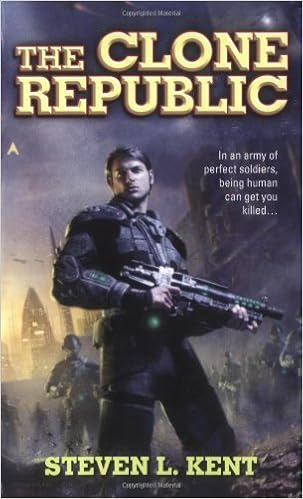
This is a remarkably good military science-fiction series I discovered through random sampling at the bookstores in my area. Humanity is well into the early stages of exploring and colonizing the galaxy thanks to the invention of Broadcast technology–basically stargates. The unified government is still headquartered on Earth and is patterned after the United States Constitution with two exceptions. One, all planet representatives must be native to Earth, creating a ruling class. Two, the military keeping the galaxy under Earth’s control uses cloning. (Much better implemented than Star Wars’ Clone Wars.) Life is stable, prosperous and as things turn out, incredibly fragile.
Not all soldiers are clones. Some are orphans, raised alongside the clones to perpetuate the illusion that clones are real people, too. (Clones are kept loyal by being programmed to die if they realize they’re clones.) The protagonist is one such orphan named Wayson Harris, newly graduated from Marine Corps basic training with top marks and then mysteriously deployed to the ass end of nowhere.
A fairly typical setup. This ain’t Shakespeare. But the genius of the series lies in its execution and believable characters. A minor interplanetary incident quickly snowballs into World War Galaxy. Heroes and villains emerge, the heroes with believable flaws and villains with believable motivations. The goals and behaviors of various factions are relevant to modern events yet kept at a sufficient distance to never take political sides. There are no heavy-handed monologues or political strawmen in the series.
There is a lot of action and the author Steven Kent does an excellent job of using the action to drive the character development, the high-quality opposite of what one normally finds in military sci-fi. The scale runs from Harris coming to terms with not only being a clone, but a model of clone that was discontinued for heinous war crimes, to fat cat politicians who end up fighting a nightmare Nemesis that shares their “winning justifies everything” morality. Add to that shifting alliances, technology employed in space-opera fashion, interesting moral issues and an astronomical bodycount: indeed, it’s almost as if the series ends because there is nobody remaining to die.
Through all the twists and treacheries, the series is kept on track by Harris’ inherent decency. He’s not blind to the fact that he’s often led by criminal scum and struggles with resentment–he attempts to retire at one point–but he’s a Marine and there’s fighting to be done, and ultimately Harris becomes an unlikely savior of humanity.
Most surprisingly, THERE ARE NO FEMALE WARRIOR PRINCESSES IN THE ENTIRE SERIES! Unheard of today. There are only a couple female characters and incredibly, the women behave like women.
The series is actually 10 books long but trust this reviewer and pretend the last three don’t exist. Kent obviously wrapped the series up at #7 and then was offered a bushel of money for three more trips to the well.
The books are easy reads. Only the first one attempts to be philosophical (Plato’s Republic), after which the author wisely gives up and proceeds with the good stuff. But the series isn’t mere war-porn, either, because the characters and plots are simply that memorable. And no kung-fu princesses!